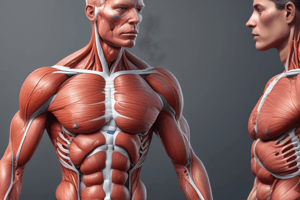Podcast
Questions and Answers
Which muscle forms the medial border of the triangle of auscultation?
Which muscle forms the medial border of the triangle of auscultation?
- Latissimus dorsi
- Trapezius (correct)
- Medial border of scapula
- Rhomboid major
What is located superficial to the contents of the cubital fossa?
What is located superficial to the contents of the cubital fossa?
- Tendon of biceps brachii
- Median nerve
- Brachial artery
- Median cubital vein (correct)
Which muscle forms the lateral border of the cubital fossa?
Which muscle forms the lateral border of the cubital fossa?
- Brachioradialis (correct)
- Pronator teres
- Flexor carpi radialis
- Brachialis
Which of the following structures is NOT part of the carpal tunnel?
Which of the following structures is NOT part of the carpal tunnel?
What are the contents of the anatomical snuffbox?
What are the contents of the anatomical snuffbox?
How many tendons from the flexor digitorum superficialis pass through the carpal tunnel?
How many tendons from the flexor digitorum superficialis pass through the carpal tunnel?
Which muscle forms the floor of the cubital fossa?
Which muscle forms the floor of the cubital fossa?
Which vein is primarily associated with the cephalic vein in the upper limb?
Which vein is primarily associated with the cephalic vein in the upper limb?
Study Notes
Triangle of Auscultation
- Borders: Trapezius muscle (medial), medial border of scapula (lateral), Latissimus dorsi muscle (inferior)
- Allows for easier auscultation of lung sounds due to thinner muscular layer
- Can be stretched and made accessible by extending the arm and rotating it externally
Cubital Fossa
- Borders: Pronator teres muscle (medial), Brachioradialis muscle (lateral), line between the epicondyles of the humerus (superior)
- Floor: Brachialis muscle, Supinator muscle
- Contents (from lateral to medial): tendon of biceps brachii muscle, brachial artery, median nerve
- Median cubital vein lies superficial to the main contents
Carpal Tunnel
- Formed by the deep arch formed by carpal bones and the flexor retinaculum (anteriorly)
- Structures passing through: 4 tendons of flexor digitorum profundus muscle, 4 tendons of flexor digitorum superficialis muscle, tendon of flexor pollicis longus muscle, median nerve
Anatomical Snuffbox
- Borders: abductor pollicis longus tendon and extensor pollicis brevis tendon (anterior), extensor pollicis longus tendon (posterior)
- Content: radial artery
Venous Return from the Upper Limbs
- Deep veins: accompany arteries with the same name, predominantly deep to the muscles, often two veins per artery (venae comitantes) in the forearm
- Superficial veins: located within the subcutaneous layer, just deep to the skin, originate from venous anastomoses on the dorsum of the hand
- Cephalic vein
- Basilic vein
Studying That Suits You
Use AI to generate personalized quizzes and flashcards to suit your learning preferences.
Related Documents
Description
Test your knowledge on the key anatomical spaces including the Triangle of Auscultation, Cubital Fossa, Carpal Tunnel, and Anatomical Snuffbox. Each section highlights their borders, contents, and clinical significance, providing a comprehensive look at these important areas. Perfect for students in anatomy or healthcare fields!



